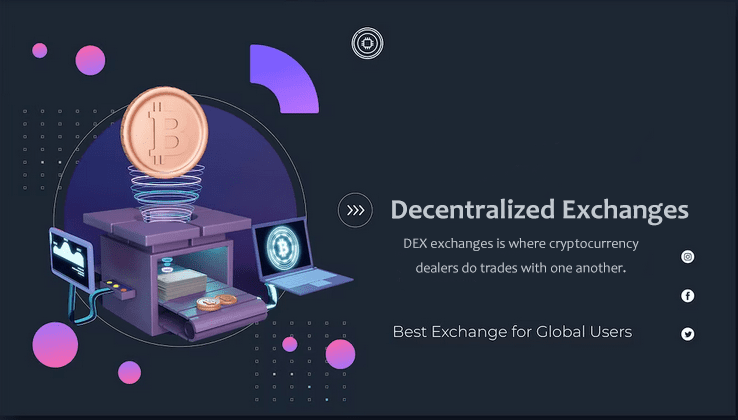
A peer-to-peer marketplace known as a decentralized exchange DEX exchanges is where cryptocurrency dealers do trades with one another.
The ability to conduct financial transactions without the assistance of banks, brokers, or other middlemen is one of the key purposes for cryptocurrencies and DEXs. Sushiwap and Uniswap are only two of the well-known DEXs that are powered by the Ethereum blockchain.
In order to eliminate the requirement for any authority to oversee and authorize agreements done within a certain exchange, DEXs were created.
Cryptocurrency trading can be done peer-to-peer on decentralized exchanges. Peer-to-peer refers to a marketplace that connects cryptocurrency buyers and sellers.
As they are frequently non-custodial, users retain ownership of their wallet’s private keys. An enhanced encryption method that gives consumers access to their cryptocurrency is known as a private key.
By entering their private key to access the DEX, users may immediately see their cryptocurrency balances. Those that value their privacy, won’t be forced to give any personal information such as names and addresses.
Automated market makers, for example, helped draw people to the decentralized finance (DeFi) area and greatly aided in its growth as innovations that addressed liquidity-related issues. Decentralized platforms expanded as a result of DEX aggregators and wallet extensions optimizing token prices, exchange fees, and slippage while providing customers with a better deal.
How does a DEX function?
Every trade involves a trading cost in addition to a transaction fee since decentralized exchanges are constructed on top of blockchain networks that enable smart contracts and allow users to maintain custody of their cash.
To utilize DEXs, traders essentially communicate with smart contracts on the blockchain.
Automatic market makers, order books DEXs, and DEX aggregators are the three primary categories of decentralized exchanges.
Through their smart contracts, all of them let users to transact directly with one another. Order books identical to those used by centralized exchanges were utilised by the first decentralized exchanges.
What advantages do decentralized exchanges offer?
Decentralization has several benefits over centralized alternatives. First, on DEXs rather than CEXs, new crypto assets nearly invariably surface far earlier. This is due to the manual addition of crypto assets to CEX systems.
Introducing new projects often involves many levels of management compliance, testing, and approval. Each new token may be instantly added to the exchange using a DEX without any requests being made.
Know Your Customer (KYC) and anti-money laundering (AML) requirements are not applicable to DEXs. As the exchange does not really exist in any one nation, no regulatory structure is applicable to it.
This has several ramifications. First of all, DEXs protect privacy. You are not required to reveal any personal information when using DEXs, including financial details like account balances.
Also, a DEX allows you to start trading right away. Before you may trade, there is no drawn-out verification process to get through.
Everyone can gain from DEXs, but they are especially useful in developing countries where a lack of a strong financial infrastructure has made it difficult for traditional financial enterprises to attract a large client base.
The last point is that you may make money on a DEX without trading. There are several methods to make money. For instance, anybody may supply liquidity on a DEX and get paid a percentage of the transaction costs.
Several DEXs also incorporate extra incentives. Usually, these are compensated with the governance token of the DEX.
Conclusion
DEXs, a crucial part of the cryptocurrency ecosystem, let users exchange digital assets directly with one another without the need for intermediaries.
During the past several years, DEXs have been more popular due to their capacity to quickly provide new currencies with liquidity, their simple onboarding procedure, and the democratized access to trading and liquidity providers they give.
It is uncertain if DEXs will become the primary venue for trading activity as well as whether the current DEX designs will continue to have institutional support and long-term expansion.
Nonetheless, it is anticipated that DEXs will continue to make strides in transaction scalability, smart contract security, governance infrastructure, and user experience. They’re expected to keep playing a big role in the bitcoin ecosystem.



